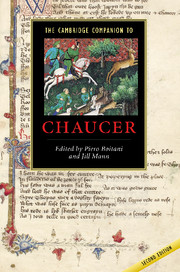Book contents
- Frontmatter
- 1 The social and literary scene in England
- 2 Chaucer’s French inheritance
- 3 Chaucer’s Italian inheritance
- 4 Old books brought to life in dreams
- 5 Telling the story in Troilus and Criseyde
- 6 Chance and destiny in Troilus and Criseyde and the Knight’s Tale
- 7 The Legend of Good Women
- 8 The Canterbury Tales
- 9 The Canterbury Tales I
- 10 The Canterbury Tales II
- 11 The Canterbury Tales III
- 12 The Canterbury Tales IV
- 13 Literary structures in Chaucer
- 14 Chaucer’s style
- 15 Chaucer’s presence and absence, 1400-1550
- 16 New approaches to Chaucer
- 17 Further reading
- Index
- Series List
15 - Chaucer’s presence and absence, 1400-1550
Published online by Cambridge University Press: 28 May 2006
- Frontmatter
- 1 The social and literary scene in England
- 2 Chaucer’s French inheritance
- 3 Chaucer’s Italian inheritance
- 4 Old books brought to life in dreams
- 5 Telling the story in Troilus and Criseyde
- 6 Chance and destiny in Troilus and Criseyde and the Knight’s Tale
- 7 The Legend of Good Women
- 8 The Canterbury Tales
- 9 The Canterbury Tales I
- 10 The Canterbury Tales II
- 11 The Canterbury Tales III
- 12 The Canterbury Tales IV
- 13 Literary structures in Chaucer
- 14 Chaucer’s style
- 15 Chaucer’s presence and absence, 1400-1550
- 16 New approaches to Chaucer
- 17 Further reading
- Index
- Series List
Summary
Chaucer and Malory are the only Middle English writers whose literary afterlife has been pretty well continuous from the fifteenth to the twenty-first centuries. Study of Chaucer in particular reveals the pressures and contours of Middle English studies with especial clarity. Many recent studies have focussed on aspects of Chaucer's reception, especially in the fifteenth and sixteenth centuries, and the present chapter is devoted to that same period. It will in part confirm the conclusions of previous work, in part challenge them. In particular, I challenge the notion that Chaucer's fifteenth-century followers were inertly unresponsive to the possibilities opened up by Chaucer's oeuvre. Indeed, it is precisely the need to isolate Chaucer's genius that produces a dismissive account of Chaucer's fifteenth-century followers; that need began in earnest in the sixteenth century.
A complete conspectus of the way in which Chaucer’s works were revised and remade would need to cover the following areas: the changing nature of the texts in which his works were presented; the way in which he was cited in broadly ‘literary’ texts; the way in which his name was deployed in political and religious controversy. I give examples of each of these areas, but a complete conspectus would occupy a large book. Instead, I propose an argument designed to account for the structure of Chaucer’s reception between 1400 and 1550 (the date of the third edition of William Thynne’s Workes of Geffray Chaucer).
- Type
- Chapter
- Information
- The Cambridge Companion to Chaucer , pp. 251 - 269Publisher: Cambridge University PressPrint publication year: 2004



